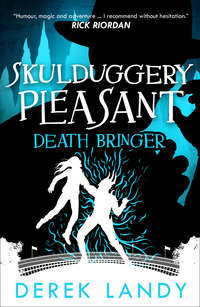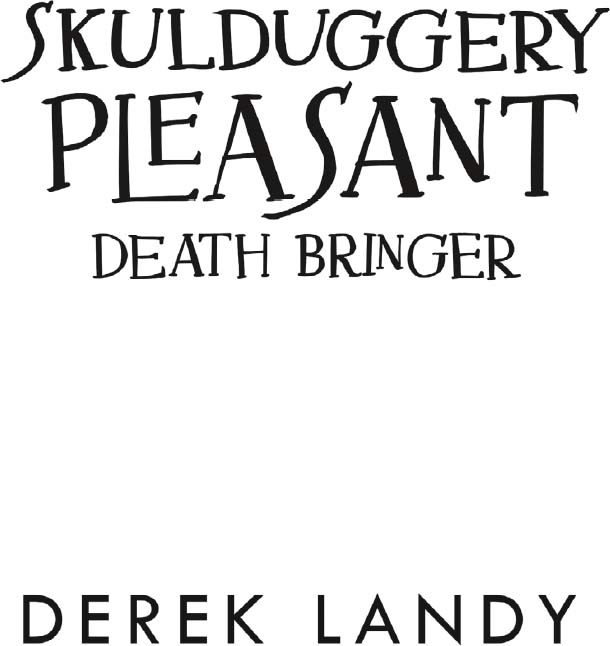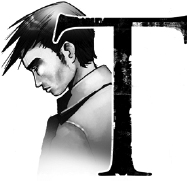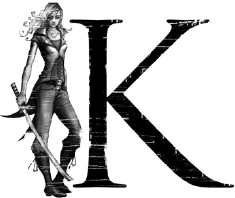
Death Bringer



First published in Great Britain by
HarperCollins Children’s Books in 2011
First published in this edition in the
United States of America by HarperCollins Children’s Books in 2018
HarperCollins Children’s Books is a division of HarperCollinsPublishers Ltd,
HarperCollins Publishers
1 London Bridge Street
London SE1 9GF
The HarperCollins website address is:
www.harpercollins.co.uk
Skulduggery Pleasant rests his weary bones on the web at:
www.skulduggerypleasant.com
Derek Landy blogs under duress at
www.dereklandy.blogspot.com
Text copyright © Derek Landy 2011
Illuminated letters copyright © Tom Percival 2011
Skulduggery Pleasant logoTM HarperCollins Publishers
Skulduggery Pleasant © TM Derek Landy
Cover design © blacksheep-uk.com
Cover illustration © Neil Swabb
Derek Landy asserts the moral right to be identified as the author of the work.
All rights reserved under International and Pan-American copyright Conventions. By payment of the required fees, you have been granted the non-exclusive, non-transferable right to access and read the text of this e-book on screen. No part of this text may be reproduced, transmitted, down-loaded, decompiled, reverse engineered, or stored in or introduced into any information storage and retrieval system, in any form or by any means, whether electronic or mechanical, now known or hereinafter invented, without the express written permission of HarperCollins.
Source ISBN: 9780008266387
Ebook Edition © ISBN: 9780008266394
Version: 2018-07-25
This book is dedicated to my nieces.
Girls, none of you were born when Skulduggery Pleasant first appeared. But since you’ve arrived, no one in our family wants to talk about the writer any more. Now all they want to talk about are the damn babies. All of a sudden, no one wants to cuddle me, and for that I blame you.
But I suppose you have your good points. It’s because of you that Valkyrie has a little sister, after all. You’re all mildly cute, reasonably adorable, and you make me laugh when you fall over.
So this book is dedicated to you, Rebecca and Emily, Sophie and Clara and
(insert names of any more nieces or nephews that might sprout up between now and when they’re old enough to read this).
I know, beyond a shadow of a doubt, that I am your favourite uncle. And you probably prefer me to your parents, too.
(I’ve met your parents. I don’t blame you. They’re rubbish.)
Contents
Cover
Title Page
Copyright
Dedication
Prologue
Chapter 1: Kenny
Chapter 2: Me and the Girl
Chapter 3: The Christening
Chapter 4: Craven
Chapter 5: The Jitter Girls
Chapter 6: China’s Secret
Chapter 7: The Death Bringer
Chapter 8: Friends in High Places
Chapter 9: Friends in Low Places
Chapter 10: The Warlock
Chapter 11: Alone at Last
Chapter 12: Bump in the Night
Chapter 13: Shadowknives
Chapter 14: The Call
Chapter 15: The Doctor is In
Chapter 16: Full Recovery
Chapter 17: The Zombie King and Co
Chapter 18: The Arrest Warrant
Chapter 19: Gods and Monsters
Chapter 20: Riding Out
Chapter 21: The Love of a Vampire
Chapter 22: The Church of the Faceless
Chapter 23: The Homecoming
Chapter 24: The Temple Siege
Chapter 25: The Vivid Dead
Chapter 26: Terminal Two
Chapter 27: Into the Temple
Chapter 28: A Vile History
Chapter 29: Who Knows What Darkness
Chapter 30: Tenebrae
Chapter 31: Fuel
Chapter 32: A Bad Night in Haggard
Chapter 33: Willow Hill
Chapter 34: Valkyrie and Fletcher
Chapter 35: Teaching the Twins
Chapter 36: Confiding in Uncle Gordon
Chapter 37: The Wisdom of Leonard Cohen
Chapter 38: Back at the Window Again
Chapter 39: Killing Craven
Chapter 40: The End of the Death Bringer
Chapter 41: Home Sweet Home
Chapter 42: A New Mission
Chapter 43: A & E
Chapter 44: Mission Accomplished
Chapter 45: The Nicest Town in Ireland
Chapter 46: The Requiem Ball
Chapter 47: This Evening’s Entertainment
Chapter 48: Going Underground
Chapter 49: The Pre-Emptive Strike
Chapter 50: China’s Ally
Chapter 51: Flirting Disastrously
Chapter 52: All Fall Down
Chapter 53: The Death Bringer Rises
Chapter 54: Monster, Murderer
Chapter 55: Tunnel Vision
Chapter 56: Panic
Chapter 57: Beheaded
Chapter 58: The Main Event
Chapter 59: Hero and Villain
Chapter 60: Tattletale
Chapter 61: My Twilight
Chapter 62: They Walk Among Us
Keep Reading …
The Skulduggery Pleasant series
About the Publisher


“It hurts,” she said.
Vandameer Craven, Cleric First Class of the Necromancer Order, esteemed Scholar of Arcane Languages and feared opponent on the debating battlefield, nodded and patted her hand. She had entered into this arrangement with the kind of zeal that only the truly greedy can muster, but recently her bouts of annoying self-pity were becoming more and more frequent. “I know, my dear, I know it does. But pain is nothing. Once our work is done, there will be no pain. You have suffered for all of us. You have suffered for all life in this world, in this universe.”
“Please,” she whimpered, “make it stop. I’ve changed my mind about this. Please. I don’t want it any more.”
“I understand,” he said sadly. “I do. You’re scared because you don’t think you’re strong enough. But I know you’re strong enough. That’s why I picked you, out of everyone. I believe in you, Melancholia. I have faith in your strength.”
“I want to go home.”
“You are home.”
“Please …”
“Now now, my dear girl, there’s no need for begging. The Surge is a beautiful, wondrous thing, and it should be cherished. You’ve taken your next step. You’ve become who you were always meant to be. We all go through it. Every sorcerer goes through it.”
She gritted her teeth as a spasm of pain arched her spine, and then she gasped, “But it’s not supposed to last so long. You said I’d be the most powerful sorcerer in the world. You didn’t say anything about this.”
Craven made the effort to look her in the eyes. He despised people who sweated, and the perspiration was rolling off her in heavy rivulets. It turned his stomach to look at her wet, dripping, scarred face. “With the power I promised you, you’ve just had to suffer a little more than the rest of us,” he explained. “But all the work we’ve been doing, preparing you, it’s going to be worth it. Trust me. The symbols I’ve etched into you are seizing the power of the Surge and they’re keeping it, they’re looping it around, letting it build, letting it grow stronger.”
“Let me out.”
“Just another day or so.”
“Let me out!” she screeched, and shadows curled round her, rising and thrashing like tentacles.
He stepped forward quickly, gave her a smile. “But of course, my dear. You’re absolutely right – the time has come.”
Her eyes widened, and the shadows retreated. He doubted she was even aware of them. Strapped and bound as she was, she shouldn’t have been able to wield any kind of power. For once, Craven’s smile was genuine. This was a good sign.
“It’s done?” she asked, her voice meek. “You’re going to let me go?”
“Let you go?” he echoed, and gave a little laugh as he undid her straps. “You make it sound like I’ve been keeping you prisoner! Melancholia, I am your friend. I am your guide. I am the one person in the whole of the world that you can trust to always be honest with you.”
“I … I know that, Cleric Craven,” she said.
He took a handkerchief from his robes and used it to take hold of her wet, slippery arm in order to help her sit up. “We have to choose the right moment to tell the High Priest about you, but once we tell him what we’ve been doing down here for all this time, it’s all going to change. Word will get out that you are the Death Bringer, and there will be many people vying for your favour. Trust none of them.”
She nodded obediently.
“There will be some who won’t understand,” he continued, “even within the Necromancer Order itself. Whenever you feel unsure, or scared, or whenever you just want to talk – I’m here for you.”
“I’m scared now,” Melancholia said, her fingers closing around the skin of his wrist. It took all his self-control not to shiver with revulsion at her clammy touch.
He smiled reassuringly. “There’s nothing to fear, not while you’re with me. Rejoice, my dear. Very soon, you’re going to save the world.”
“Good and evil are so close as to be chained together in the soul.”
Dr Jekyll and Mr Hyde (1941)


The car spluttered and coughed and retched, and Kenny’s grip tightened on the steering wheel. “No,” he said. “Please.” The car belched and juddered in response, smoke filling his windscreen. Images flashed into his mind of the car suddenly exploding into a giant fireball, and he tore off his seatbelt and lunged out on to the sun-drenched street. Horns honked. Kenny jumped sideways to avoid a cursing cyclist who shot past him like a foul-tempered bullet. Dublin traffic on a Sunday morning wasn’t that bad at all. Dublin traffic on a Sunday morning with a big game on was terrible. Irate drivers with county flags stuck to their cars glared at him as they were forced to change lanes.
Kenny smiled apologetically, then looked back at his car. It was not exploding. He reached in, grabbed his bag and turned off the ignition. The car wheezed and slipped gratefully into an early death. Kenny left it there in the street and hailed a taxi.
He was late. He couldn’t believe he was late. He couldn’t believe that he hadn’t learned his lesson, even after all these years of being late to things. How many interviews had he messed up because of his inability to arrive on time? Actors, rock stars, politicians, business people, citizens both rich and famous and poor and unknown – he had been late to meet all of them. It was not a good quality in a journalist, he had to admit, especially when every newspaper was cutting back on staff. Print was dead, they were saying. Not as dead as Kenny was going to be if he didn’t get the piece finished by the end of the month.
This story was juicy. It was glorious and bizarre and unique – the kind of thing that stood a chance of being picked up by other papers around the world, maybe even a few magazines. Whenever Kenny entertained that possibility, his mouth watered. A solid pay day. Food in the fridge, no worrying about rent for a while. Maybe even a half-decent car, if he got really lucky.
He glanced at his watch. Fifteen minutes late. He bit his lip and tapped his fingers on his bag, willing the road ahead to miraculously clear. He didn’t know how long his source would stick around, and if Kenny missed this chance, he doubted he’d get another. Tracking down Paul Lynch in the first place had not been easy, but then finding one homeless person in a city like Dublin was never going to be straightforward. And it wasn’t like Lynch had a phone or anything.
The taxi crawled along to another set of traffic lights and Kenny almost whimpered.
It was probably unhealthy to pin so much hope on one article that hadn’t even been commissioned, but there was really very little choice. Kenny needed a lucky break. He’d started off well, worked up to some high-profile interviews and articles, but then it all started to slide away from him. He could see it happening, but couldn’t do anything to stop it. Now he was freelance, thrown the occasional job, but his editors left it up to him to go out and find the stories himself. And that’s what he’d done.
When he’d first heard the rumours, years ago, he’d dismissed them. Of course he had. They were crazy. He wrote a few articles, noting the trend in the modern urban legend, but he’d never read more into it than that. But they persisted, these stories of strange people with strange powers doing strange things. Wonderful stuff, and not just the ravings of lunatics and paranoids and the disturbed. These stories were everywhere. They popped up occasionally on the Internet, then vanished just as fast. A few of the reports he’d followed up on had turned out to be hoaxes, with the person who reported the sighting now claiming to have no idea what he was talking about. He’d been close to forgetting the whole thing when he met Lynch. Lynch was Kenny’s link. In all his years of casual investigation, Lynch was his one solid lead – as solid a lead as a muttering homeless man could be, anyway – and Kenny had a feeling he was ready to reveal everything he knew. Kenny had spoken to him three times already, and felt he was beginning to earn his trust.
Today was the day, he knew. If only he could get there in time.
The taxi stopped again and Kenny lost patience. He paid the driver, lurched out of the car, swung his bag over his shoulder and ran.
Twenty seconds of running and he was seriously regretting this move. He hadn’t run in years. Good God, running was hard. And hot. Sweat formed on his brow. His lungs ached. He had shin splints.
He staggered to the next corner and hailed a taxi. It was the same taxi he’d just got out of.
“Didn’t go too well for you, did it?” asked the driver smugly.
Kenny just gasped and panted in the back seat.
They finally reached the park and Kenny paid the driver, again, and hurried across the grass. There were people everywhere, stretched out in the May sunshine, laughing and chatting, walking and eating ice cream. Small dogs scampered after their owners. Music played. The pond glinted.
Kenny saw Paul Lynch, sitting in the shade away from everyone, and a smile broke across his face like a wave of cool water. He wiped the sweat from his brow and walked over, taking it slower, holding up a hand in greeting. Lynch didn’t return the gesture. He just sat there, his back against the railing, shoulders slumped. He was probably in a bad mood.
If only he’d really been a psychic, then he’d have foreseen Kenny’s late arrival and there wouldn’t be a problem. Kenny’s smile turned to a grin.
“Sorry,” he said once he stepped into the shade. “The traffic, you know, and the car broke down, and I had to get a taxi.”
Lynch didn’t answer. He didn’t even raise his head.
Kenny stood there awkwardly, then shrugged and sat down. “Glorious morning, isn’t it? I swear, you can never tell how an Irish summer is going to turn out. Do you want an ice cream or something? I’d love an ice cream.”
Again, no response. Lynch’s eyes were closed.
“Paul?”
Kenny reached out and nudged his one solid lead. Nudged him again. Then he saw the blood that drenched Lynch’s shirt, and he grabbed him and shook him. Lynch’s head rolled back, revealing a throat with a long, smooth slit, like a red eye opening.


The door to his right opened, and two people entered. The man was tall and thin, dressed in a dark blue suit of impeccable tailoring. He wore a hat like a 1940s private eye. He sat on the other side of the table and took the hat off. He had dark hair and high cheekbones. His eyes seemed to have trouble focusing. His skin looked waxy. He wore gloves.
His companion stood against the wall behind him. She was tall and pretty and dark-haired, but she couldn’t have been more than sixteen years old. She was dressed in black trousers and a tight black jacket, zipped halfway up, made of some material Kenny didn’t recognise. She didn’t look at him.
“Hi.” The man’s smile was bright. He had good teeth.
“Hi,” Kenny said.
The girl said nothing.
The man had a smooth voice, like velvet. “I’m Detective Inspector Me. Unusual name, I know. My family were incredibly narcissistic. I’m lucky I escaped with any degree of humility at all, to be honest, but then I’ve always managed to exceed expectations. You are Kenny Dunne, are you not?”
“I am.”
“Just a few questions for you, Mr Dunne. Or Kenny. Can I call you Kenny? I feel we’ve become friends these past few seconds. Can I call you Kenny?”
“Sure,” Kenny said, slightly baffled.
“Thank you. Thank you very much. It’s important you feel comfortable around me, Kenny. It’s important we build up a level of trust. That way I’ll catch you completely unprepared when I suddenly accuse you of murder.”
Kenny’s eyebrows shot up. “What?”
“Oh dear,” said Inspector Me. “That wasn’t supposed to happen for another few minutes.”
“I didn’t kill Paul Lynch!”
“Could we go back to the nice feeling of trust we were building up?”
“Listen, I had arranged to meet him, I was going to interview him, but when I got there he was already dead.”
“You’d be surprised how often we hear the ‘he was already dead’ defence in our line of work. Or maybe you wouldn’t, I don’t know. The point is, Kenny, it’s not looking good for you. Maybe if you tell us everything you know, we can persuade our colleagues to go easy on you.”
Kenny stared at the man, then looked over at the girl. “Who are you?”
She returned his look, raised an eyebrow, but didn’t answer.
“She’s here on work experience,” said Inspector Me. “Don’t you worry about her, Kenny. You just worry about yourself. What was your relationship with the corpse?”
“Uh,” Kenny said, “I’m a journalist. He’s someone I’d interviewed a few times.”
“About what?”
“It’s … nothing. He is, or he was, a conspiracy nut, kind of.”
“Conspiracies? You mean like government cover-ups, that sort of thing?”
“No, not really. He was more …” Kenny sighed. “Listen, it’s a long story.”
“I don’t have anywhere else to be,” said Inspector Me, and glanced back at the girl. “Do you?”
“Yes, actually,” she said. “I have a christening to get to.”
“Oh,” said Me. “Of course.” He turned back to Kenny. “So maybe if you talk really fast, you can explain it to us.”
Kenny took a moment, deciding on the best way to avoid sounding like a lunatic. “Right,” he said. “For the past few years, I’ve been investigating some oddball stories. Nothing big, nothing major, but stories that get ignored because when you hear them, they sound insane. No newspaper is going to take this stuff seriously, so I can really only devote a small amount of time to them.
“It started when I did a piece on urban legends. You have all your usual stuff, modern myths and burgeoning folklore, some funny, some horrible, some creepy, everything you’d expect to hear. But I started hearing new ones.”
“Like what?”
“Just rumours, snippets of stories. Someone saw a gunfight where people threw fire. Someone saw a man leap over a building, or a woman just disappear.”
Inspector Me tilted his head. “So the modern urban legend is about superheroes?”
“That’s what I was thinking, but now I’m not so sure. I’ve been hearing whispers about an entire subculture where this stuff goes on. Lynch said it’s everywhere, if you know what to look for.”
“I see. And did Lynch claim to be such a superhero?”
“Lynch? No. God, no. I mean, he wasn’t well, obviously. He had visions, he said. That’s what he called them, visions. He’d had them since he was a teenager. They scared the hell out of him. He was sent to psychiatrist after psychiatrist, given pill after pill, but nothing worked. He’d describe these visions to me and they seemed so vivid, so real. He couldn’t hold down a job, couldn’t maintain a relationship … He ended up homeless, drinking too much, muttering away to himself in doorways.”
“And this,” Inspector Me said, “was your source?”
“I know he sounds unreliable.”
“Just a touch.”
“But I stuck at it, listened to what he was saying. Eventually, I learned how to separate the ramblings from the … well, the facts, I suppose.”
“What kinds of things did he see?” asked the girl.
Kenny frowned. He didn’t really understand what gave a student on work experience the right to question him, but Inspector Me didn’t object, so Kenny reluctantly answered. “He saw the apocalypse,” he said. “He saw a few of them, to be honest. The first one concerned these Dark Gods, the Faceless Ones, whatever he called them. Someone banished them eons ago, nobody knows who, and they’ve been trying to get back ever since. When he was seventeen, Lynch had a vision in which they returned. He saw millions dead. Cities levelled. He saw the world break apart. He kept having these visions, and every time it would be some new aspect, some new viewpoint from which to watch the world end. He was convinced we were all going to die one night, a little under three years ago. He said these things, these god-creatures, would emerge through a glowing yellow door between realities. Of course no one would listen to him. And then the night came when the world was going to end … and it didn’t. And the visions stopped.”

